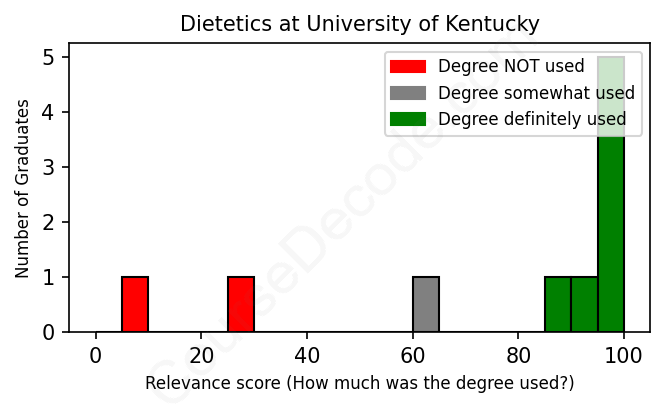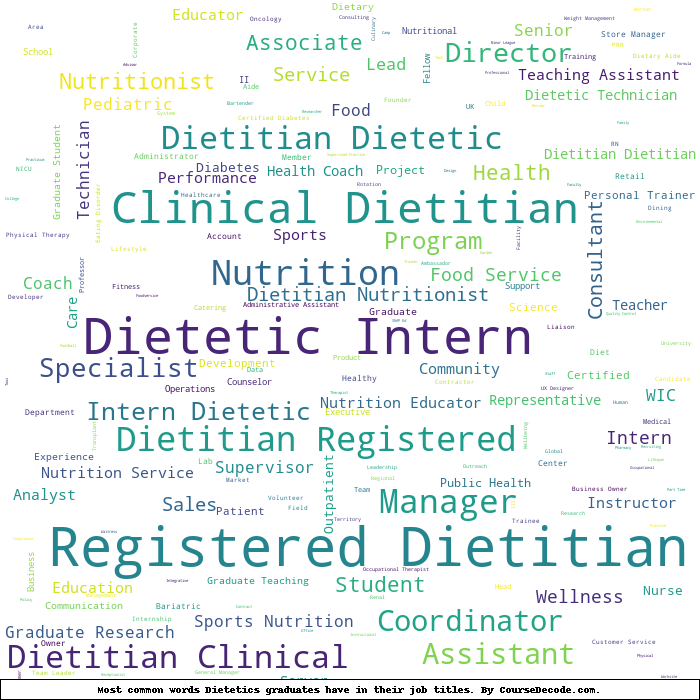
First, some facts. Of the Dietetics graduates from University of Kentucky we've analyzed , here's how many have used (or NOT used) their degree in their career:

These are estimates based on AI analysis of 10 LinkedIn profiles (see below).
The verdict? Above average. Overall, with an average relevance score of 76%, Dietetics graduates from University of Kentucky have a higher likelihood (+9%) of finding work in this field compared to the average graduate across all fields:
And for comparison, here's the chart for all profiles we've looked at across all degrees.
Also, after graduating, 50% of these graduates have pursued further education other than another Bachelor's degree (such as a Masters degree or other), compared to the average across all profiles of 35%. This suggests you may need more than just a Bachelors degree to be competitive as a Dietetics graduate.
See the details:
|
Relevance score: 100% We think this person has gone into a career highly relevant to their degree. We think this person has gone into a career highly relevant to their degree.
DEGREE INFOGraduated in 2021 from University of Kentucky with a Bachelor's degree in Dietetics. No other secondary education since. JOB HISTORY SINCE GRADUATIONDietetic Intern University of Nevada, Reno Oct 2022 - Apr 2023 ABOUTNo information provided. |
The top 10 most common jobs done by the graduates we've analyzed (ranked most common to least) are:
After taking a look at the LinkedIn profiles of people who graduated with a degree in Dietetics from the University of Kentucky, it seems like a majority of them have gone on to work in roles that are pretty relevant to nutrition and dietetics. Positions like Registered Dietitian and Nutrition Education Coordinator really stand out since they directly utilize the skills and knowledge they gained during their studies. Many have taken on roles that focus on health education, clinical nutrition, or dietary counseling, which are all central to what you learn in a Dietetics program.
However, not all jobs are perfectly aligned with the degree. Some graduates have found themselves in positions like Customer Service Representative or Veterinary Technician, which don’t really have much to do with dietetics. It looks like there's a mix of roles that directly connect to the field and others that don't utilize the degree as effectively. The internships and clinical roles seem to reflect a strong tie to dietetics, but as they progress, some graduates shift into positions where their degree isn't as relevant. So while many are using their Dietetics education, there are definitely exceptions where they ventured into unrelated job fields.
Here is a visual representation of the most common words in job titles for Dietetics graduates (this is across all Dietetics graduates we've analyzed, not just those who went to University of Kentucky):

Based on the job histories of recent graduates from the University of Kentucky's Dietetics program, many of them have found their footing in relevant fields soon after graduation. A common first step seems to be internships related to nutrition, health education, or dietetics roles. For instance, several graduates took on roles like Dietetic Intern or Nutrition Education Coordinator shortly after earning their degree. It's clear that many graduates are entering positions that align directly with their studies, often becoming Registered Dietitians or taking roles within healthcare settings.
As for where they end up five or ten years later, the trend appears to hold strong. Many graduates have established themselves as Registered Dietitians in various organizations, including healthcare systems and government agencies. A few have even moved into managerial roles within food service or wellness programs. While there are some instances where graduates shifted to jobs that are less directly related to dietetics, such as retail or customer service positions, the majority seem to be maintaining a focus on nutrition and health. Overall, it seems that a degree in Dietetics from the University of Kentucky offers a solid pathway to a fulfilling career in the nutrition field, even if the journey varies from person to person.
Honestly, pursuing a Bachelor’s degree in Dietetics can be pretty challenging, but it really depends on your interests and strengths. At the University of Kentucky, like many other schools, the program includes a mix of science-heavy courses like biology and chemistry, along with classes on nutrition, foodservice management, and even psychology. If you're into science and enjoy learning about how food affects health, it might feel more manageable. However, the workload can be intense with all the studying, projects, and practical experiences involved. So, while it’s definitely doable, it’s not a walk in the park either—just keep your motivation up, and you'll be fine!
Most commonly, in the LinkedIn profiles we've looked at, it takes people 4 years to finish a Bachelor degree in Dietetics.
So, looking at these Dietetics grads from the University of Kentucky, it seems like they’ve had a pretty mixed bag when it comes to earning potential. Those who graduated earlier, like in 2011 or 2012, jumped into roles like Registered Dietitian, which can be a solid career with decent pay, especially if you stick around in the field. However, a few of them took some detours into jobs that don’t seem to fully utilize their qualifications, like customer service roles or internships that pay less. The more recent grads from 2021 and 2022 are still hustling through internships and lower-level positions like nutrition aides and assistants, which likely means they aren't bringing in too much money just yet. Overall, while some have found good jobs in healthcare where they can earn decent salaries, others are still on the path to building that good income, so it's a bit of a mixed picture!
Here is a visual representation of the most common words seen in the "about" section of LinkedIn profiles who have a Bachelor degree in Dietetics (this is across all Dietetics graduates we've analyzed, not just those who went to University of Kentucky). This may or may not be useful:

Here are all colleges offering a Bachelor degree in Dietetics (ordered by the average relevance score of their Dietetics graduates, best to worst) where we have analyzed at least 10 of their graduates:
| College | Score | Count |
|---|---|---|
 University of Delaware University of Delaware
|
87 | 13 |
 Purdue University Purdue University
|
79 | 10 |
 University of Kentucky University of Kentucky
|
76 | 10 |
 Michigan State University Michigan State University
|
74 | 16 |
 Brigham Young University Brigham Young University
|
73 | 12 |
 Iowa State University Iowa State University
|
72 | 13 |
 Florida State University Florida State University
|
67 | 11 |
 Arizona State University Arizona State University
|
65 | 12 |